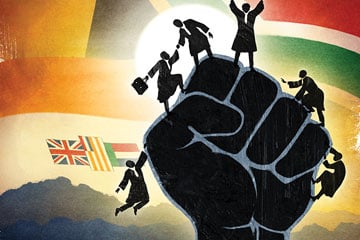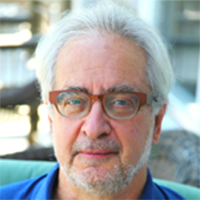After apartheid, South African lawyers moved from being immoral technicians to champions of equality.

After apartheid, South African lawyers moved from being immoral technicians to champions of equality.
After apartheid, South African lawyers moved from being immoral technicians to champions of equality. South Africa’s peaceful transition from apartheid, a system of legalized racial discrimination, to freedom and democracy (albeit flawed) was one of the great political achievements of the 20th century. The process culminated in 1994 with the election of Nelson Mandela as South Africa’s president. But when Mandela left office in 1999, the country’s government and the African National Congress, the dominant political party and for many years an engine of freedom, sunk into autocracy and corruption, reaching a low point during the presidency of the incompetent and venal Jacob Zuma, who took office in 2009 and resigned in disgrace this past February.
Two institutions helped this troubled country emerge into freedom and avoid complete political chaos and collapse. One is a courageous and vibrant free press, essential to any democracy. The other is an independent legal profession. But the record of the South Africa legal profession has been mixed, particularly during the apartheid years (1948-1990). Some lawyers during that time behaved admirably, fighting for equality and justice, often at great personal cost. Many did not, regarding themselves as impartial technicians and immersing themselves in legal details while ignoring the evil nature of the regime they served. Queen’s University Belfast and Ulster University, in a series of country studies (Tunisia, Palestine, Israel, Chile, Colombia and South Africa), have explored the role of lawyers in transitions from violence or authoritarianism to something better (see lawyersconflictandtransition.org). They published their report on South Africa in December 2016. It describes how, during the apartheid years, many lawyers worked unthinkingly within a highly formal and legalistic regime, often described as a wicked legal system, revelling in a dense system of intricate rules. Others — sometimes called “struggle lawyers” — were dissidents as well as lawyers. Struggle lawyers challenged the vicious apartheid regime in the courts and sought to protect those who suffered detention without trial and torture. The great Albie Sachs, who after apartheid became a judge of the Constitutional Court, South Africa’s highest court, has said, “For much of my life, I lived simultaneously as lawyer and as outlaw.”
The 1998 report of the Truth and Reconciliation Commission of South Africa contained powerful criticism of apartheid-era lawyers. Arthur Chaskalson, chief justice of South Africa from 2001 to 2005, wrote in 2003 that the TRC condemned the legal profession “for its silence in the face of unjust laws . . . for its failure to make justice available to those who could not afford it, and for its acceptance of the legality of unjust laws.” But the TRC also praised some lawyers who “used every opportunity to speak out publicly and within the profession against the adoption and execution of rules of law that sanctioned arbitrary official conduct and injustice.” Chaskalson himself was one of these lawyers.
During the so-called Transition Period (1990-94), lawyers had a major role in the drafting of the new South African Constitution (formally adopted in 1996), which includes a bill of rights drawing heavily on the Canadian Charter of Rights and Freedoms. The constitution also bestows a variety of socio-economic rights, requiring the state to act to achieve the progressive realization of access to housing, health care, food, water, social security and land. These rights, existing in the no-man’s-land between law and policy, gave powerful arguments to activist lawyers. One former constitutional court judge is quoted in the Queens/Ulster report as saying, “If you want the triumph of idealist transformatory law with lawyers in a way at the helm, I wouldn’t say driving the whole process but at the helm, I would say the South African Constitution making process was an example.”
Since 1994, public interest litigation and lawyering in general have helped deliver on post-apartheid promises. A prominent example was the successful challenge by gay and lesbian groups of sodomy laws. Another was the Treatment Action Campaign’s case forcing the government to allow the administering in public hospitals of anti-retroviral drugs to children born of mothers with HIV/AIDS. The government was also ordered to develop a comprehensive national program to prevent or reduce mother-to-child HIV/AIDS transmission. But serious problems of access to justice, familiar, alas, to Canadians as well, are everywhere. Many South Africans, just like Canadians, are unaware of their legal rights and, in any event, do not have the financial resources to pursue them.
During apartheid, most South African lawyers eschewed moral responsibility and were simple legal technicians, navigating thoughtlessly through evil laws handed to them by wicked politicians. Then, with the end of apartheid, and the putting in place of a new and empowering constitution, many lawyers became what lawyers should always be, legal architects using the law to build justice and equality.
Update
Recent “Troubled World” columns considered the legal professions in Ukraine and China. Since they were written, there have been unpleasant developments in both countries.
In my Ukraine column, I noted, “New York law firm Skadden Arps apparently indirectly received large payments for advice given in 2012 to the pro-Russian government of Viktor Yanukovych, who later fled the country. . . . Bloomberg News has reported that it was Paul Manafort, the recently federally indicted former Trump campaign manager, who recruited Skadden to give legal advice to Yanukovych.” In late February, the New York Times reported that a Skadden lawyer, Alex van der Zwaan, had been charged with lying to the special counsel investigating Russian election interference.
In my column on China, I wrote that Chinese lawyers “operate in a system where, to function effectively, they have to turn their faces to the wall and pretend things are not as they really are. For, in China, state power and the power of the Communist Party are supreme.” At the beginning of March, the Wall Street Journal reported that lawyers protesting the proposed removal of presidential term limits were visited by police and threatened with disbarment. ![]()
Philip Slayton has been a visiting professor at the University of Cape Town’s law faculty. His latest book is How To Be Good: The Struggle Between Law and Ethics.











